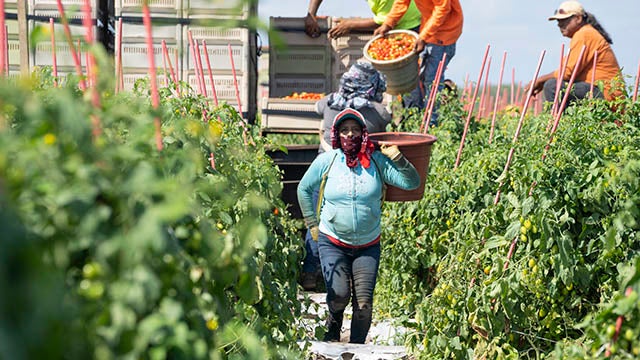Globally, 795 million people are undernourished, the vast majority of whom live in developing countries. And each day, 7,000 children around the world die from causes related to malnutrition. But with coordinated action, according to a new report from the Aspen Institute Food Security Strategy Group, organizations can work to reach the sustainable development goal of ending hunger by 2030.
First comes the recognition that it is nearly impossible to address issues like national security, political stability, and economic growth without first addressing food security, which the World Health Organization defines as existing when all people at all times have access to sufficient, safe, nutritious food to maintain a healthy and active life. When people are hungry and do not know where their next meal is coming from, risks of civil unrest and political conflict are heightened, threatening democratic governance.
The Food Security Strategy Group (FSSG) provides six recommendations to strengthen food security and create a foundation for sustainable international development. Read below for four takeaways from the report.
To build food security, it is crucial to address women’s health needs.
In countries where women, on average, have fewer children and better access to health care – which includes voluntary family planning and better prenatal care – the maternal and infant mortality rates are lower, food is more affordable, and food security is stronger. Investment in women’s health care pays off as it curbs unsustainable population growth. With smaller and healthier populations, people can afford to take care of and feed their families.
Environmentally sustainable agriculture practices will help feed more people.
It may seem like the answer to food insecurity is just producing more food, but according to the FSSG, “merely creating more food is neither adequate nor desirable: global agricultural producers need to produce more but with less land.”
The trick is producing more, but with a smaller environmental footprint.
The FSSG notes soil quality and water resources are two key indicators that can help governments assess areas to implement practices like irrigation, which helps ensure that the soil stays fertile to yield better and stronger crops, and gives farmers access to the water they need. Countries will need to develop policies to conserve their natural resources.
Another aspect of sustainable food security is addressing food waste. Every year, 32 percent of the food produced by the world is lost or wasted. But 65 percent of that wasted food is gone before even reaching the consumer. There are several possible strategies to address this – including working directly with farmers to improve their harvest and storage facilities, increasing the use of pasteurization and other food preservation techniques, or making infrastructure investments so that the food can easily reach markets before spoiling.
Long-term food security requires significant political commitment — and it begins by addressing the underlying system of inequalities that leads to hunger.
Most food produced today is consumed by the nation in which it is produced: global food trade accounts for less than a fifth of global annual food consumption. The FSSG points to protecting farmers’ land rights as a key aspect of increasing food security. When farmers are confident that their land won’t be taken from them, they are more likely to employ sustainable agricultural practices like soil protection, which is much better for their farms and communities in the long run. When sustainable agricultural practices are employed, the soil remains more fertile and is able to produce more food over a longer period of time.
Property rights policies must also be made with women in mind: they comprise more than 60 percent of smallholder farmers, but often do not receive the same legal protections and financing options as their male counterparts. Creating policies that specifically reach women will help to lift a majority of farms out of poverty and into food security.
Coordinated action between the public sector, government, and the private sector can help to strengthen food security at all levels.
“Existing food security imperatives should be linked with each other, rather than developing new solutions ‘from scratch’ in each region,” says the FSSG.
Their report is calling for the development and standardization of public-private partnerships, which it says, are currently operating in parallel silos. There are myriad moving parts in the global food chain, ranging from smallholder farmers to countries’ agriculture ministries. The United Nations’ food agencies are increasingly turning to the private sector for partnerships, which can help to finance and support a wide range of projects, helping them to expand and reach more people. Potential private sector partners range from investors and global agribusinesses to rural enterprises and cooperatives for smallholder farmers. Involving and embedding the private sector into governmental and UN food security initiatives will help to align development projects and coordinate the global food chain.
Read the full report for more key takeaways and insights.
The Food Security Strategy Group (FSSG) was a three-year, high-level, non-partisan, and international dialogue series comprised of prominent and influential leaders in business, government, non-profit organizations and academia brought together to address the urgent need for cross-sector alignment on a long-term vision for food security planning.

